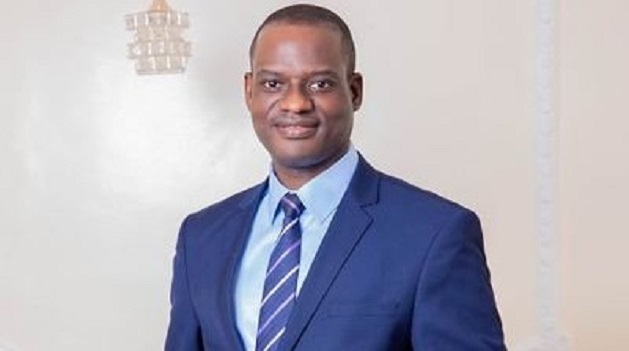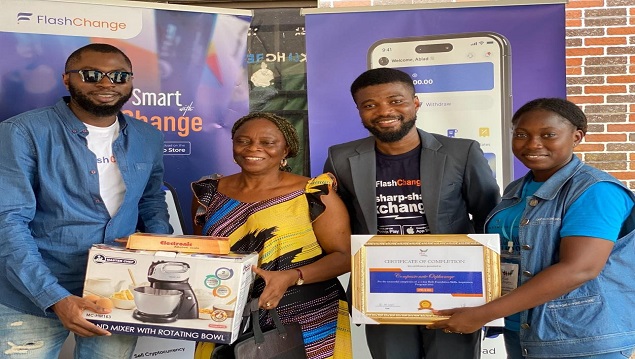General News
UBA Rewards Customers with over N41m in Final Edition of Legacy Promo

United Bank for Africa (UBA) Plc, Africa’s global Bank, has distributed over N41.8m in prizes to over 100 lucky customers in its just concluded UBA Legacy Promo series.

The promo which began last year, was specially designed by the bank to celebrate UBA’s rich legacy spanning over 75 years, as well as its long-standing commitment towards rewarding its loyal customers in a grand style.
The campaign, which was opened to several categories of Account holders including Bumper Account holders, Savings account, Kiddies & Teens Account holders as well as Nextgen account holders, also saw lucky customers winning other consolidation prizes including educational grants.
The winners were announced during the Grand Finale draw of the promo which held at the UBA Head-office, Marina, Lagos last Thursday and was witnessed by members journalists and representatives of relevant regulatory bodies including the National Lottery Regulatory Commission (NLRC), among other stakeholders.
In the Savings Account category, ten loyal customers walked away with N1,000,000 each. The lucky winners are: Olonade Funmilayo, Abdullahi Yunusa, Anibueze Augustine Chidozie, Ibironke Adedayo, Gilbert Godswill Pepple, Ekonmene Daniel Leghemo, Oligbo Francis Azuka, Liafeez Adebowale, Abiodun Bolanle Felicia, and Adamu Bappayo.
When contacted over the phone, one of the winners, Mr. Oligbo Francis Azuka, who won N1,000,000 in the savings account category expressed his surprise and excitement, stating that it was totally unexpected. He was however grateful to the bank for the gesture, adding: “I am deeply grateful and surprised by this reward from UBA. I honestly, didn’t expect this. I really appreciate the fact that UBA recognizes me. I am very grateful,” he stated.
The Bumper Category saw 10 people who emerged winners of N1,000,000 each. They are: Emem Christian Thompson, Lateefat Omotayo Waheed, Victoria Oluwaferanmi Adebusoye, Nkechinyere Agnes Okolo, Ibrahim Rabiu, Hammed Akande Idowu, Modester Chiadikobi Nwoke, Ajisafe Folashade Success, Thelma Ndubisi Enajiyerin, and Sunday Obaje.
20 lucky customers also received N500,000 each. They are: Ojo Goroye Banjo, Sandra Christopher Effiong, Femi Henry Idehen, Rashida Oiza Momohjimoh, Umar Usman, Joshua Chidera Nweke, Racheal Erhieyovwe, and Fatima Muhammed. Others include Ogbonna Edward, Eziuche Goodluck Chinyere, Lydia Bawa, Obiajulu Augustine Agwazia, Sale Barde, and Sikiru Morakinyo; Tajudeen Kareem Opeloyeru, Regina Queen Abeekaa, Isaac M. Ponfa, Mary Amos, Emmanuel Isa, and Amaechi Okoro.
Also in the bumper category another twenty customers got N250,000 each, while 10 lucky customers each won N100,000 each during the live draws.
In the NextGen category, Emmanuel Olakotan Oke, Sharon Oluwafunmilayo Ibitoye, Fortunate Izegboya Ijewemen, Anozie Janerose Chinelo, Maryam Zaharaddeen, Oluwakamikun Faidat Taiwo, Daniel Ayomikun Olawale, Ayomide Goodness Olowodara, Dennis Ogina Gbele, and Ofeoritse Jessica Waya each received N180,000 pocket money for a year.
The Kiddies and Teens category, also saw 20 young customers receiving N200,000 each in educational grants.
UBA’s Group Head, Retail and Digital Banking, Shamsideen Fashola, who spoke at the event, emphasized the significance of the promotion in strengthening the relationship between the bank and its community.
He said, “UBA Legacy Promo is our way of saying thank you to our loyal customers who have trusted us over the years. As we celebrate 75 years of impact, we remain committed to deepening financial inclusion and providing innovative and customer-focused products and services. Our goal is to make banking more rewarding and life-changing, improving lives and building stronger communities.”
Over the past six months, from July till December 2024, UBA has through a series of draws; cluster, monthly, and quarterly draws, rewarded over 600 customers with prizes totaling more than ₦200 million. This remarkable initiative has created over 60 millionaires, highlighting the bank’s commitment to enriching the lives of its customers and promoting savings culture, as UBA continues to reaffirm its dedication to launching more impactful initiatives, ensuring customer satisfaction and financial well-being remain at the forefront of its operations.
United Bank for Africa is one of the largest employers in the financial sector on the African continent, with 25,000 employees group wide and serving over 45 million customers globally. Operating in twenty African countries and the United Kingdom, the United States of America, France and the United Arab Emirates, UBA provides retail, commercial and institutional banking services, leading financial inclusion and implementing cutting edge technology.
General News
FG to Introduce New Tax Credit Scheme to Replace Pioneer Status Incentive

As part of Nigeria’s ongoing tax reform efforts, the federal government is proposing a new investment-driven incentive framework aimed at addressing long-standing inefficiencies in the current Pioneer Status Incentive (PSI).

The new scheme, known as the Economic Development Incentive (EDI), is designed to stimulate real economic activity by tying tax relief directly to verifiable investments.
This was the focus of a keynote address delivered by Taiwo Oyedele, Chairman of the Presidential Committee on Fiscal Policy and Tax Reforms, at BusinessDay’s Policy Intervention Series held on April 22 in Lagos.
According to Oyedele, a close review of the Pioneer Status Incentive revealed structural flaws that have undermined its effectiveness. “Once granted Pioneer Status,” he said, “companies may import goods classified as ‘pioneer products’ tax-free, effectively allowing them to operate without tax obligations—even with minimal value addition to the economy.”
He further noted that while the PSI was initially designed to encourage investment, it created loopholes and ambiguities. For example, businesses often benefit from extended tax relief even after the designated holiday period ends.
“The assets used during the Pioneer period are essentially frozen in time,” Oyedele explained. “They’re treated as if acquired after the incentive ends—meaning companies only start claiming deductions once the holiday period is over. This creates long-term tax advantages that go well beyond the policy’s original intent.”
He also pointed out that the PSI makes it difficult for the government to quantify revenue forgone and for investors to clearly assess the value of the incentive—undermining transparency on both sides.
The Economic Development Incentive
The proposed Economic Development Incentive is a departure from the one-size-fits-all model. Instead, it’s structured around priority sectors—primarily manufacturing, followed by services and infrastructure—that have strong multiplier effects on the economy.
Another key design feature is the introduction of minimum investment thresholds to ensure only scalable and impactful projects qualify. For instance, companies operating in capital-intensive sectors like utilities would need to invest at least N200 billion to be eligible for the tax credit.
“The EDI is about real impact,” Oyedele said. “It’s time-bound, sector-targeted, and tied to actual capital deployment—not just approval on paper.”
Unlike blanket tax holidays, the EDI grants companies a 5 percent annual tax credit over five years—totaling 25 percent of the value of their qualifying investment. Importantly, this is in addition to existing capital allowances, making the scheme particularly attractive to long-term investors.
Crucially, approval under the scheme does not mean the investment has already been made. It only confirms that the company has a verified plan. The incentive kicks in only after capital is actually deployed, and all investments are subject to inspection by the Industrial Inspectorate Division.
Oyedele broke down how the system works using practical examples:
If a company invests N10 billion in Year 1, it earns a N500 million tax credit each year for five years. If an additional N5 billion is invested in Year 2, that new investment begins its own five-year 5 percent cycle—N250 million annually until Year 6.
If the company continues investing progressively, each round of investment starts a new five-year cycle of tax credits, potentially extending the benefit period up to 10 years.
For instance, if a business has a N15 million tax liability in a given year and applies N25 million in tax credits, its liability is wiped out entirely, with the N10 million balance rolled over to subsequent years.
However, there’s a catch: if a company fails to follow through on its investment plan or halts capital deployment, unused credits are forfeited. This accountability mechanism ensures that only consistent and credible investments are rewarded.
General News
FlashChange Partners Ruth Foundation to Empower Vulnerable Children in Alimosho with Skill Acquisition

In an inspiring initiative to uplift the next generation, FlashChange and Ruth Foundation have successfully implemented the “Orphanage Skill Acquisition Assembly 2.0 program,” a skills empowerment program for vulnerable children in Alimosho, Local Government Area of Lagos state.

The five-day programme, which began on Monday, April 14, was created to equip vulnerable children aged 4 to 18 years with essential life skills such as financial literacy, fashion design, photography, creative arts, cooking, and leadership development
Speaking at the closing ceremony of this year’s edition of the programme, the Chief Operating Officer, Flashchange, Olamide Ajibola said, “We are delighted to be part of this life-changing initiative.
“At FlashChange, we believe that children are the heartbeat of every community, by investing in their development today, we are not just shaping the future of individuals but nurturing future leaders, creators, and change-makers that would make a positive contribution to the growth and development of the society in the near future.”
“Initiatives of this nature gladdens our heart and we are open and willing to participate in them at any time. In the coming months, we hope to do more in that area as our own little way of improving society. This is in line with our CSR pillars, which include human capital development.”
Ajibola appreciated the benefitting children for accepting to be part of the life changing training which has the capacity to catapult them to a brighter future. The facilitators were also commended for impacting the children with the skills and knowledge to help shape their lives.
The founder Ruth Foundation, Itunuoluwa Ruth Da-Silva, in her remarks, expressed the foundation’s deepest appreciation to partnering organizations like FlashChange for believing in the vision and throwing their full weight behind it.
She said, “It will interest you to know that 153 vulnerable children benefitted from the Orphanage Skill Acquisition Assembly 2.0 programme and the training ran simultaneously at Compassionate Orphanage home; Precious Pearl Orphanage; Little Saints Orphanage and House of Mercy Orphanage respectively. Providing the children access to knowledge and skills early in life to create a ripple effect that can transform the entire community.”
The Chief Marketing Officer, FlashChange Jesujoba Ojelabi commended Ruth foundation for the initiative and urged the children to take the skills learnt seriously, as it has the capacity to change their lives for good.
He said, “As a company, we would be proud to lend our support to the foundation whenever we are called upon to do so in the future. My candid advice to you children would be this, to be great ambassadors of this initiative, you need to continuously put to practice the skills and knowledge you have acquired from the programme. We are indeed proud of you all and the success stories recorded so far.”
To support the continuous development of the children the following items were donated; electric sewing machine, cake mixer; packs of Yeye yarn, packs of pins, some stitch markers, scissors, measuring scale, make-up kit box filled with make-up tools among several others.
FlashChange and Ruth Foundation therefore urge community leaders, government organizations, private sector partners, and stakeholders to support programmes of this nature aimed at equipping children with the skills they need to thrive in a world that is evolving quickly.
General News
EFCC Clarifies SCUML Certificate Misuse amid CBEX Ponzi Scheme Scandal

Economic and Financial Crimes Commission, EFCC, has dismissed the claims that the defunct digital asset trading platform, CBEX, was registered with its Special Control Unit against Money Laundering, SCUML.

However, EFCC stated that ST Technologies and not CBEX registered with SCUML, saying that the certificate didn’t imply clearance by the Commission.
The clarification comes after Lesley Kessy Oviritsa, one of the victims of the CBEX Ponzi Scheme said she fell prey to CBEX after seeing and verifying its CAC and SCUML Certificate.
Oviritsa claimed they had no reason to suspect foul play, especially since they claimed their SEC certificate would be ready by May 2025.
Nigeria CommunicationsWeek reported how CBEX swept over N1.3 trillion from their investors’ accounts.
In a post on its official handle on X on Monday, EFCC said the Commission is not a clearing house or regulatory authority of online businesses.
The post read: “SCUML Certificate Is Not CLEARANCE BY EFCC.
“ST Technologies (not CBEX) registered with the Special Control Unit against Money Laundering, SCUML in line with Section 17 of the Money Laundering, (Prevention & Prohibition) Act, 2022.
“Registration is a statutory requirement for all Designated Non-Financial Businesses and Professions, DNFBPs, in Nigeria in consonance with Nigeria’s Anti-Money Laundering/ Control of Financing Terrorism, AML/CFT regime.
“The EFCC is not a clearing house or regulatory authority of online businesses.
“But financial fraud of any kind is the remit of the Commission, and it is committed to ensuring justice for victims of the CBEX scam.”

 Telecom2 days ago
Telecom2 days agoDigital Transformation Remains Africa’s Gateway to Economic Advancement – Adumike

 Telecom2 days ago
Telecom2 days agoPAFON 2.0: Experts Discuss Pathways to Boost Financial Inclusion in Nigeria

 General News2 days ago
General News2 days agoEFCC Clarifies SCUML Certificate Misuse amid CBEX Ponzi Scheme Scandal

 E-Financial2 days ago
E-Financial2 days agoCBN, NGX Group Defend Economic Reforms at Nasdaq

 Telecom1 day ago
Telecom1 day agoMTN Nigeria Faces Class Action Lawsuit over Alleged Data Mismanagement

 Telecom1 day ago
Telecom1 day agoNigeria Hits 1 Terabit Internet Traffic Milestone

 General News1 day ago
General News1 day agoFG to Introduce New Tax Credit Scheme to Replace Pioneer Status Incentive

 E-Financial1 day ago
E-Financial1 day agoFCMB Capital Markets Leads ₦11.85bn GLNG Bond for LNG Plant Expansion



























